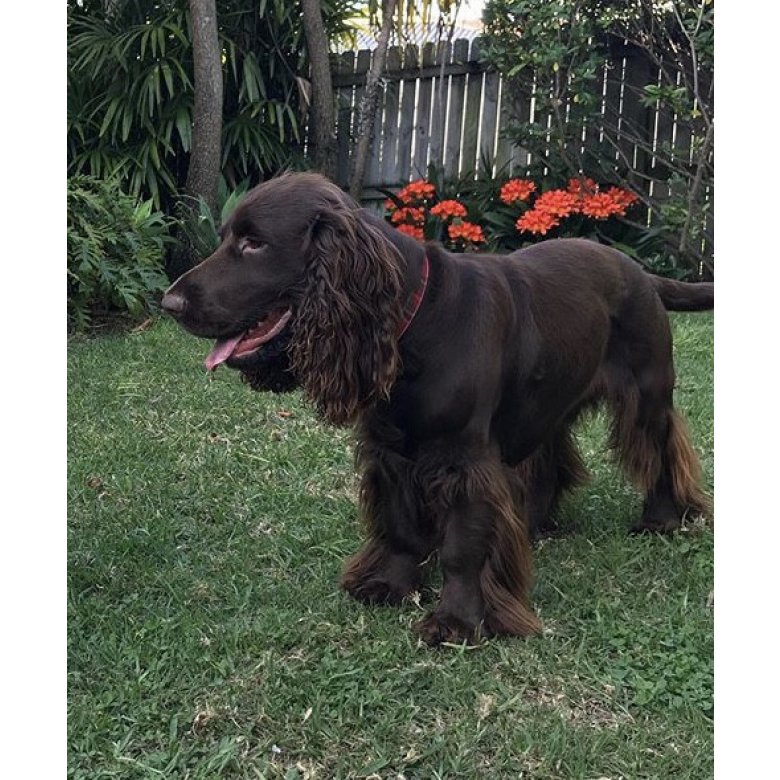Why Field Spaniels are great
Field Spaniels are a rare breed of spaniel, although similar to that of Springer, Cocker and Sussex Spaniels. They are renowned for being docile and loving, yet alert and active due to their hunting origins. They have a glossy coat and are rather handsome in stature. Some highlights:
Field Spaniels are affectionate and fit well into families with children.
This breed loves an active lifestyle and playing games.
If taught from a young age, Field Spaniels react well to discipline and remain very obedient.
A Field Spaniel’s size makes them ideal for a smaller home.
Things to consider when looking at Field Spaniels for Sale
This breed can suffer from separation anxiety and needs vigorous exercise and attention. Some downsides to the Field Spaniel:
Field Spaniels struggle being left alone for long periods times, becoming nervous and destructive.
Their independent nature can prove tiresome when training Field Spaniels.
A Field Spaniel is not a suitable dog for a first-time owner.
History of Field Spaniels
Field Spaniels originally were bred for show as an all-black dog around 150 years ago. Their long, low stature was elongated through breeding and eventually, due to the many health complications that arose from such breeding, they became unpopular. The Field Spaniels’ dark coat also meant they were not useful as a hunting dog, as they were hard to spot in hunting conditions. As a result, Field Spaniels began to decline, nearly to the point of extinction. Even today, the Field Spaniel is classed as a rare breed and the Kennel Club has registered them as a Vulnerable Native Breed. However, their loving qualities and excitable nature have kept the breed going, and in the mid-1900s enthusiasts bred Field Spaniels with Cocker and Springer Spaniels to rebuild the Field Spaniels original line.
Appearance
How big is the Field Spaniel?
Field Spaniels are a small spaniel, with males standing around 43-46cm and females are only slightly shorter at 41-43cm.
How heavy is a Field Spaniel?
They are also fairly light. An average male Field Spaniel is 18-22kg, whilst females are 13-20kg.
What Colour is the Field Spaniel?
Usually, the Field Spaniel has a solid, glossy coat coloured either black, liver or roan. Tan or white markings can sometimes be seen on the chest or throat, but this is rarer.
Temperament
Do Field Spaniels make good guard dogs?
A field Spaniel is a calmer breed of dog, but their wariness towards strangers means that they can make a good guard dog, despite their lack of aggression.
Do Field Spaniels bark a lot?
Field Spaniels tend to bark at everything they see or hear since they are known to like the sound of their own voice. However, this can be engrained out of a Field Spaniel, if disciplined with the “quiet” command from a puppy.
Are Field Spaniels easy to train?
Field Spaniels do have a reputation of being quite an independent dog, but their intelligence and problem-solving abilities mean that they do respond well to training. They will thrive with clear and calm communication and will retain commands very obediently. Bear in mind that they do not respond well to harsh correction or shouting. Baby gates are also very useful when they are puppies, to stop them from escaping into areas they shouldn’t!
Are Field Spaniels playful?
Although they are a more docile breed, the Field Spaniel still enjoys a run-around in the garden and being clownish. Their intelligence makes them an excellent candidate for canine competitions too!
Are Field Spaniels good with children?
The Field Spaniel is excellent with children, their calm nature ensues that the Spaniel is not fazed by any ear or tail pulling.
Are Field Spaniels good with other pets?
Field Spaniels are a sociable breed and interact well with other dogs or animals. However, the Field Spaniel must be monitored at first when around smaller pets, such as hamsters, because of their hunting instinct.
Can I leave a Field Spaniel Alone?
Field Spaniels are an active, sporting breed and can become destructive if they are left at home for long periods of time. They are also a very social animal, so enjoy being surrounded by people and are known to suffer from separation anxiety. They would be happiest perhaps in a family with a stay at home parent or a retired person.
Do Field Spaniels like water?
Field Spaniels do not just like water, they love it! Their coats are water repellent, having been adapted from when they used to work in the when working in the water and marshes to keep them dry. Field Spaniels have feathering on their chest, stomachs and the back of their legs, but none from their hocks to their feet
Health
How long do Field Spaniels live?
Field Spaniels have a longer lifespan than other small dogs of about 12-14 years.
How much exercise does a Field Spaniel need?
Despite being docile and small, Field Spaniels need rigorous exercise. They will benefit even more so from runs and games in which they have to ‘problem-solve’. For a spaniel to be truly happy, they need to be kept busy.
What are Field Spaniels Common health issues?
As with other Spaniels, there are a couple of common problems. Field Spaniels can be prone to eye disorders, such as cataracts and retinal atrophy. Hypothyroidism also can occur, as well as ear problems. It is recommended that you regularly take your field spaniel for eye and ear tests. Your Field Spaniel should be hip scored too, to prevent hip dysplasia. Field Spaniels often suffer from allergies, but normally a vet can help to stop these, after a first flare-up.
Care
How much space do I need for a Field Spaniel?
A large garden would be preferred for a Field Spaniel, but they can cope with apartment life if they are outside for most of the day. It is worth bearing in mind that Field Spaniels tend to bark a lot which could disrupt neighbours.
What should I feed my Field Spaniel?
Field Spaniels should be fed a well-balanced diet and they are often driven by food. They love treats and scraps, but these should be given sparingly to avoid overfeeding. Fatty foods and bones should be avoided completely, especially after being spayed or neutered when they are most prone to gaining weight.
How much grooming do Field Spaniels need?
A Field Spaniel has a glossy, long single coat which requires grooming at least 3 times a week to prevent it from becoming matted and to remove dirt. Their eyes and ears should be checked weekly too for any redness or infection.
Do Field Spaniels shed?
Despite their long hair, Field Spaniels are only an average shedder. Regular grooming should help to get rid of any loose hair.
Average costs
How much does it cost to keep a Field Spaniel?
As a rough guide in pricing: Cost to buy: roughly £300-800 for a well-bred Field Spaniel puppy Other costs (Vet, Food etc): £65-100 per month
Specific Buying Guide
You can read our general buying guide here (/advice-on-buying-a-puppy/), with the most important thing being going to view your xx Puppy, seeing it with its mother, and checking the quality of the breeder. More specifically, here is some Field Spaniel puppy buying advice:
Due to their rarity, breeders can demand a lot more money than necessary for a Field Spaniel or they can breed their dogs far more regularly than is healthy. The Kennel Club has therefore imposed rules that Field Spaniel bitches should not reproduce under 18 months old, and from then on, only have one litter a year. The Kennel Club highly recommend that Field Spaniel breeders carry out eye testing and hip scoring in their dogs and it is important to find out if this has been done before purchasing a puppy. Traditionally, Field Spaniels’ tails were docked, but since 2007, this has been banned so make sure to buy spaniels that are not docked.
Other reading, Adopting Field Spaniel Puppies and Rescue Organisations
A big thank you to the following sources who helped to shape this article: https://www.thekennelclub.org.uk https://fieldspanielsociety.co.uk https://spanielassist.com/dogs-in-foster https://www.akc.org/dog-breeds/field-spaniel/














